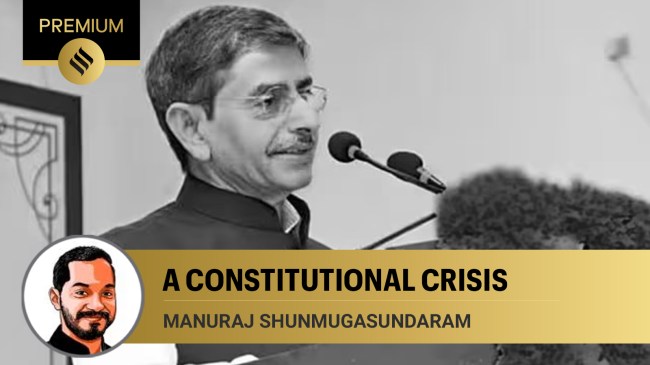Opinion Governor R N Ravi’s walkout deepens Tamil Nadu crisis: Time to abolish governorships?
Unfortunately, the actions of various governors have, instead of tying up the loose ends of Union-state relations, caused more damage to the federal fabric of the country
 In the Tamil Nadu legislative assembly, the previous year witnessed a walkout when the chief minister objected to Ravi reading out an unapproved and abridged version of the Governor’s Address. (File)
In the Tamil Nadu legislative assembly, the previous year witnessed a walkout when the chief minister objected to Ravi reading out an unapproved and abridged version of the Governor’s Address. (File) On Monday, at the inaugural session of the Tamil Nadu Legislative Assembly, Governor R N Ravi did not read the text prepared by the state government. Instead, he walked out in a similar fashion to the previous year and later claimed that he did not agree with the remarks prepared by the government of Tamil Nadu. In such circumstances, the underlying conflict within the executive branch of the government comes to the fore and results in a constitutional crisis. There have been other instances of Governor Ravi withholding Bills duly passed by the Assembly and even referring these to the President of India. Such actions further strengthen the long-standing and compelling argument that the position of the governor itself has lost its constitutional utility in a modern democratic setup.
There has been an increase in the interference of governors in the domain of governance in non-BJP-ruled states. Regularly, states like Kerala, Telangana, Punjab, Delhi and West Bengal have witnessed such constitutional friction, which has ultimately impeded governance. Many of these states had approached the Supreme Court to seek directions for governors to pass bills in accordance with the constitutional scheme. In some cases, such as Telangana, the 2022 assembly session began without the customary Governor’s Address.
In the Tamil Nadu legislative assembly, the previous year witnessed a walkout when the chief minister objected to Ravi reading out an unapproved and abridged version of the Governor’s Address. In this year’s session, he staged a similar exit while Assembly proceedings were ongoing, stating that the Governor’s Address “contained numerous passages with misleading claims and facts” and reading them would amount to “a constitutional travesty”.
The governor’s office also released a press communication which stated that the governor had asked for the national anthem to be sung before the commencement of the address but that was not done.
On the first issue, the state minister for law has explained that the governor had not sought clarification regarding any factual issues. Secondly, it is well known in Tamil Nadu that the protocol followed in official government events begins with the Tamil Thai Vazhthu (Tamil anthem) and concludes with the national anthem. The well-established protocol was followed in the present session as well. However, without understanding this, the governor seems to be building a case against his state government as if they have failed in some moral obligation or have a vested agenda against the national anthem. Both of these arguments are unsubstantiated and do not behove the constitutional office occupied by Ravi.
It is well known that the governor is required by the Constitution to act only in accordance with the aid and advice of the council of ministers and as such, no discretion is provided for in terms of his functions. When it comes to the Governor’s Address, these are merely curtain raisers for the assembly session. They are not much more than formal statements made on behalf of the state government.
The role of governors was always envisaged as a bridge between the elected governments at the state and the Union. The original idea was presumably that the larger interest of the country would be served better if we had a person with statesmanship beyond partisanship occupying the Raj Bhavan. Unfortunately, recent events have led us to think that the actions of various governors have, instead of tying up the loose ends of Union-state relations, caused more damage to the federal fabric of the country.
Such incidents have revived the necessity to review the role and position of the governor within the constitutional architecture. The Supreme Court has recently and repeatedly held that the governor has no discretionary power in matters of governance. This position was reiterated in A G Perarivalan vs State (2022) wherein the Supreme Court called the governor a “short-hand expression for state government”. When it comes to the withholding of bills passed by the assembly, the Supreme Court has been curt in dealing with such constitutional digressions and has essentially cut short the self-proclaimed role of the governor in such matters. So, this raises a larger question on the necessity for the governorship as an institution itself.
The value addition to the constitutional scheme by the office of the governor seems to be minimal at best.
We have persisted with the “nominal head” only for customary reasons and not based on any promise made to ourselves to enhance constitutional democracy. As such, governments seem to function perfectly well with real executive heads in the form of the chief ministers and the collective responsibility of the council of ministers. The present constitutional crisis which has eroded the federal structure beyond recognition is a wake-up call. It may only be a matter of time before a future Parliament may regard governorships as unnecessary colonial vestiges and disregard them altogether.
The writer is an advocate practising before the High Court of Madras and National Media Spokesperson, Dravida Munnetra Kazhagam. Inputs for this article were provided by Dhileepan P





